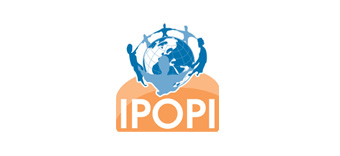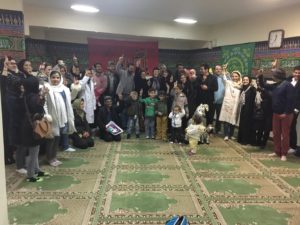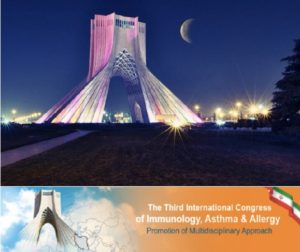Medical congress and patients meeting in Iran
March 23, 2017
The Immunology, Asthma and Allergy Research Institute (IAARI) from Iran held its 3rd international congress at Imam Khomeini Hospital, in Tehran, from February 15-17. The event promoted multidisciplinary approach and gathered 14 international experts. IPOPI’s Vice President was among them and gave a key note lecture on “Why is it worth to work together: patient organisation, scientific and medical community? Benefits and Challenges” which was very inspiring for participants. Iranian physicians are very committed to their patients and the patient themselves look forward to being more involved in decisions related to their care.
IAARI prepared a strong programme dedicated to PIDs with lectures covering diagnosis, clinical care, research, team management in PIDs and more. Martine Pergent also took part in a panel discussion on “Team Work in PID Management” alongside with a dentist, a psychologist, an infectious disease physician and a nutritionist.
IAARI organised also a patients and families meeting that brought together 35 families. This allowed adult PID patients and parent of children with PID to share experiences and to show their willingness to advocate for their conditions.
Martine Pergent was invited to visit the Immunology, Asthma and Allergy Research Institute and the Imam Khomeini Hospital after the congress. The visit was most interesting and IPOPI’s VP was honoured to greet the very dedicated teams of physicians who do all that is possible for their patients. She also met with some PID patients who were in the transplant unit awaiting treatment.
Iran is a vast country and IPOPI took the opportunity to also visit other immunology centers in the Tehran, Kerman, Shiraz, Yazd and Esfahan University Hospitals.
Steps forward
In Iran, physicians are highly committed to diagnosis, care and research in benefit of their patients. Patient and families are able and certainly willing to take part in a patient organisation to advocate for their needs. Patients and physicians need to work together to improve access to diagnosis and treatment.
Cooperation is key and IPOPI is looking forward to help physicians foster the involvement and the empowerment of patients. Let us consider this is a wish for Nowrooz (Iranian New Year).
Happy Nowrooz to all Iranian PID families and friends!
| Iran – Patients needs overview | |
| Diagnosis | High underdiagnoses: 1,600 patients diagnosed in a population of 78 million inhabitants. |
| Consanguinity rate | High consanguinity rate. Official numbers report 37% (might be higher in some regions). |
| Genetic testing | Several hospitals visited mentioned difficulties in genetic diagnosis. are sent abroad, i.e. in Belgium (mostly when the costs are covered by a charity). and was seeking help from foreign centres. Samples |
| Prevalence of conditions | Some conditions are more prevalent than in western countries, especially LAD, Mendelian susceptibility to mycobacterial disease (MSMD) also. |
| BCG vaccination | BCG vaccine that is given to babies on the day of life. Tuberculosis is uncommon in most regions but remains endemic in areas among Afghan immigrants. BCG disseminated Disease is the first cause of death among SCID babies. |
| Access to care | IVIG is very expensive for most patients as they are not fully reimbursed. HSCT is performed in Tehran and Shiraz. The costs, the need to travel and the difficulty in finding a matching donor make it difficult for the patient access this type of treatment.Support offered by local organisations helps some families in accessing to treatment. |


